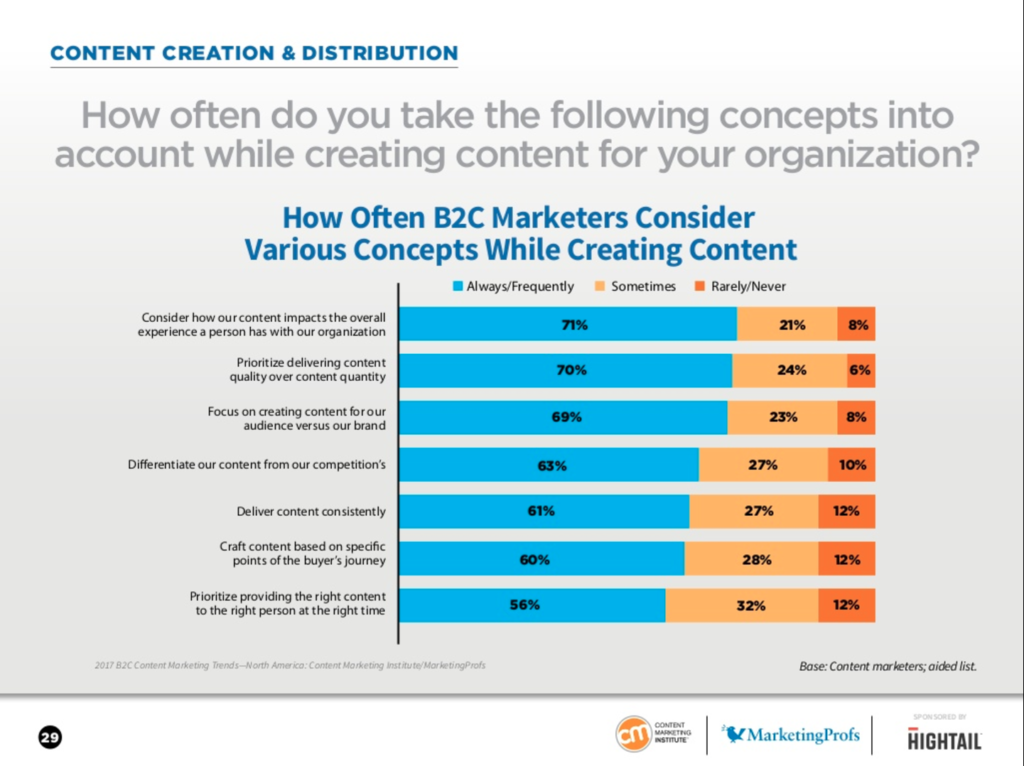Should Your School Blog? Consider The Facts.

Your school does not need to blog.
Yes. I said it. It is not a requirement for your school to have a blog. Our crowded-with-content world does not NEED another blog.
But — our world does need better content. Exceptional content. Content that connects people, helps people, draws people in.
So if you feel like your school has something to say, has a message that goes beyond marketing, your school does not need to blog — but SHOULD.
Should, because your story deserves it. Should, because your audience is craving it. Should, because it will set you apart and make it so.much.easier. for you to explain who you are and why you’re different.
Still not sure if blogging is right for your school? Let’s go past the emotional pull and look at the rational, business side. Here is some of the latest research on blogging that should influence your strategy this year:
The Content Marketing Institute & MarketingProfs recently completed annual research on B2C (Business to Consumer) 2017 Content Marketing Benchmarks, Budgets & Trends. (And psst! You school marketers and communicators are B2C marketers!) The statistics below are from that report. Ok, let’s dive in!
86% of marketers say their organization uses content marketing (creating valuable and consistent content to attract and retain an audience).
Most marketers say they have been able to develop a business case for content creation and have seen early success. In fact …
78% of marketers say they can demonstrate, with metrics, how content marketing has increased audience engagement. 67% can prove that content marketing increased their number of leads.
That’s pretty awesome news, since one of the main goals of creating ongoing content through blogging or other initiatives is to grow and connect with your audience. The lesson here: blogging can get you measurable results.
71% of marketers say their organization is focused more on building long-term relationships than on getting quick results from content marketing.
According to CMI’s Joe Pulizzi, it takes 12-24 months to get results from your content marketing efforts. This means that blogging, and other content marketing efforts, are not meant to get quick, campaign-like results. It needs to be a long-term commitment to creating quality content and audience connection if you want to be successful. (For quicker results, Pulizzi says paying to promote your content is a critical way to build your audience.)
51% of marketers said blogging is the tactic that will be the most critical to its content marketing success in 2017.
In addition, 58% said social media would be most critical. These two go hand-in-hand: when you create fantastic, original blog content, you have fantastic, original content to share on social media — content that drives readers back to a platform that YOU own.
So how are marketers selecting the content on which to focus? Here’s how often they consider various concepts while creating content:

(image via ContentMarketingInstitute.com)
It should be noted that the top answer is “how our content impacts the overall experience a person has with our organization.” Remember: your content is for your audience, not you. You want to please them, help them, educate them, every step of the way.
Those are the top statistics from this detailed report, but some additional facts to consider from Orbit Media’s annual survey of 1000+ bloggers:
- The average blog post takes 3 hours 16 minutes to write. That’s a 26% increase from last year.
- 33% of bloggers who spend 6+ hours per post report “strong results”, while only 23% of bloggers who spend less than 6 hours per post report “strong results” (so, added effort matters!).
- The length of the average blog post is up 19%, to about 1050 words.
- Weekly publishing is now the most common answer to the question of frequency.
- Most bloggers are now using email marketing to promote their content.
See all the results, and read expert analysis of each data point, here.
Convinced you need to blog, but don’t know where to start? Check out our resource library.
MORE ARTICLES
-
 AI Writing Prompts to Power Private School Storytelling
AI Writing Prompts to Power Private School Storytelling -
 How to Write a Compelling School Magazine Article People Want to Read
How to Write a Compelling School Magazine Article People Want to Read -
 How to Get School Blog Readers to Stick Around
How to Get School Blog Readers to Stick Around -
 Craft a Better School Blog Post with These 5 Quick Edits
Craft a Better School Blog Post with These 5 Quick Edits -
 Quick Fixes to Make Your School Blog Post Instantly Pop
Quick Fixes to Make Your School Blog Post Instantly Pop -
 10 Do’s and Don’ts for School Blogs
10 Do’s and Don’ts for School Blogs -
 The Case for School Content Marketing
The Case for School Content Marketing -
 5 Quick Tips for Crafting a Standout School Blog Post
5 Quick Tips for Crafting a Standout School Blog Post

